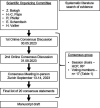Early major fracture care in polytrauma-priorities in the context of concomitant injuries: A Delphi consensus process and systematic review
- PMID: 39085995
- PMCID: PMC11446538
- DOI: 10.1097/TA.0000000000004428
Early major fracture care in polytrauma-priorities in the context of concomitant injuries: A Delphi consensus process and systematic review
Abstract
Background: The timing of major fracture care in polytrauma patients has a relevant impact on outcomes. Yet, standardized treatment strategies with respect to concomitant injuries are rare. This study aims to provide expert recommendations regarding the timing of major fracture care in the presence of concomitant injuries to the brain, thorax, abdomen, spine/spinal cord, and vasculature, as well as multiple fractures.
Methods: This study used the Delphi method supported by a systematic review. The review was conducted in the Medline and EMBASE databases to identify relevant literature on the timing of fracture care for patients with the aforementioned injury patterns. Then, consensus statements were developed by 17 international multidisciplinary experts based on the available evidence. The statements underwent repeated adjustments in online- and in-person meetings and were finally voted on. An agreement of ≥75% was set as the threshold for consensus. The level of evidence of the identified publications was rated using the GRADE approach.
Results: A total of 12,476 publications were identified, and 73 were included. The majority of publications recommended early surgery (47/73). The threshold for early surgery was set within 24 hours in 45 publications. The expert panel developed 20 consensus statements and consensus >90% was achieved for all, with 15 reaching 100%. These statements define conditions and exceptions for early definitive fracture care in the presence of traumatic brain injury (n = 5), abdominal trauma (n = 4), thoracic trauma (n = 3), multiple extremity fractures (n = 3), spinal (cord) injuries (n = 3), and vascular injuries (n = 2).
Conclusion: A total of 20 statements were developed on the timing of fracture fixation in patients with associated injuries. All statements agree that major fracture care should be initiated within 24 hours of admission and completed within that timeframe unless the clinical status or severe associated issues prevent the patient from going to the operating room.
Level of evidence: Systematic Review/Meta-Analysis; Level IV.
Copyright © 2024 American Association for the Surgery of Trauma.
Figures
References
-
- Dunham CM Bosse MJ Clancy TV Cole FJ Jr. Coles MJ Knuth T, et al. Practice management guidelines for the optimal timing of long-bone fracture stabilization in polytrauma patients: the EAST Practice Management Guidelines Work Group. J Trauma. 2001;50(5):958–967. - PubMed
-
- Pape HC Hildebrand F Pertschy S Zelle B Garapati R Grimme K, et al. Changes in the management of femoral shaft fractures in polytrauma patients: from early total care to damage control orthopedic surgery. J Trauma. 2002;53(3):452–461; discussion 61-2. - PubMed
-
- Nahm NJ, Vallier HA. Timing of definitive treatment of femoral shaft fractures in patients with multiple injuries: a systematic review of randomized and nonrandomized trials. J Trauma Acute Care Surg. 2012;73(5):1046–1063. - PubMed
-
- Probst C, Probst T, Gaensslen A, Krettek C, Pape HC. Timing and duration of the initial pelvic stabilization after multiple trauma in patients from the German Trauma Registry: is there an influence on outcome? J Trauma. 2007;62(2):370–377; discussion 6-7. - PubMed
-
- Pfeifer R, Klingebiel FK, Halvachizadeh S, Kalbas Y, Pape HC. How to clear polytrauma patients for fracture fixation: results of a systematic review of the literature. Injury. 2023;54(2):292–317. - PubMed
Publication types
MeSH terms
LinkOut - more resources
Full Text Sources
Research Materials




